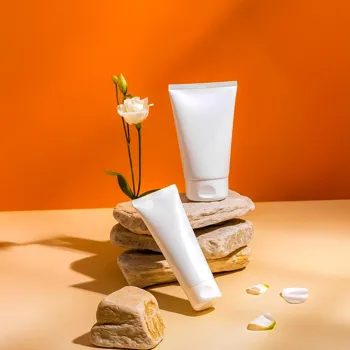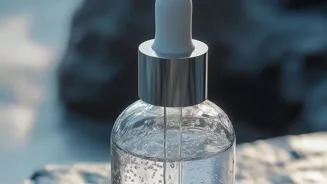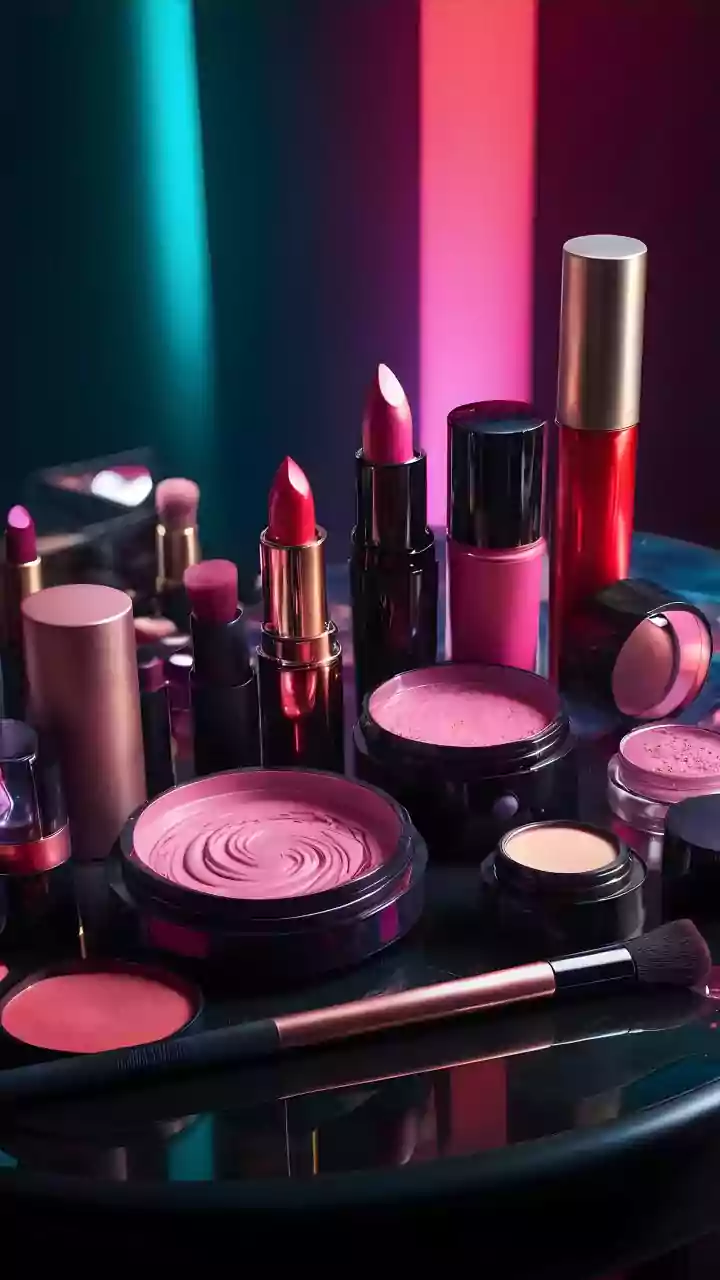Unlock Radiant Skin: The Power of Exfoliation. Dive into the world of skincare secrets for a smoother, brighter complexion
In the bustling streets and diverse climates of India, one thing unites us all:
the desire for healthy, glowing skin. While we diligently cleanse and moisturize, often one crucial step gets overlooked: exfoliation.
Exfoliation, the process of removing dead skin cells from the surface of your skin, is not just a beauty fad; it's a fundamental practice for maintaining skin health and achieving that coveted radiance.
Think of it like spring cleaning for your face – shedding the old to reveal the fresh and new underneath. But with so many exfoliating products and methods available, how do you choose the right one for your unique skin type?
Let's dive deep into the world of exfoliation and uncover the secrets to a smoother, brighter complexion.
Exfoliation clears pores, smooths skin, and improves texture
Exfoliation offers a plethora of benefits that extend far beyond simply making your skin look good. First and foremost, it helps to unclog pores.
Throughout the day, our skin is constantly exposed to dirt, pollution, and excess oil, which can accumulate in pores, leading to blackheads, whiteheads, and breakouts. By regularly exfoliating, you effectively remove these impurities, preventing them from building up and causing blemishes.
A deep exfoliation makes your skin very smooth that helps you feel happy. Moreover, exfoliation improves skin texture. Dead skin cells can make the skin feel rough, bumpy, and uneven. Exfoliating helps to even out the skin's surface, leaving it feeling softer and smoother.
This is particularly beneficial for those with dry or flaky skin, as it removes the dead skin cells that contribute to the dryness and roughness.
Exfoliation boosts skincare absorption, collagen production for youthful skin
Furthermore, exfoliation enhances the absorption of skincare products. When dead skin cells are present on the surface, they act as a barrier, preventing your serums, moisturizers, and other treatments from penetrating effectively.

By removing this barrier, exfoliation allows your skincare products to reach the deeper layers of the skin, where they can work their magic. This means you'll get the most out of your investment in skincare, as your products will be able to deliver their intended benefits.
Also, exfoliation helps to stimulate collagen production. Collagen is a protein that provides structure and elasticity to the skin, keeping it firm and youthful. As we age, collagen production naturally declines, leading to wrinkles and sagging skin.
Exfoliating helps to boost collagen synthesis, which can improve skin firmness and reduce the appearance of fine lines and wrinkles. Choosing the right exfoliation ensures a better result.
Exploring physical and chemical exfoliation methods for skin
Now that we understand the importance of exfoliation, let's explore the different methods available. There are primarily two categories of exfoliation: physical and chemical. Physical exfoliation involves using abrasive materials to manually scrub away dead skin cells.
Common examples include scrubs with beads, sugar, salt, or coffee grounds, as well as exfoliating brushes, sponges, and cloths.
While physical exfoliation can provide instant gratification by immediately revealing smoother skin, it's crucial to be gentle and avoid harsh scrubbing, as this can irritate the skin and cause micro-tears.
Chemical exfoliation, on the other hand, uses acids or enzymes to dissolve the bonds between dead skin cells, allowing them to be easily sloughed off.
Popular chemical exfoliants include alpha-hydroxy acids (AHAs) like glycolic acid and lactic acid, beta-hydroxy acids (BHAs) like salicylic acid, and enzymes derived from fruits like papaya and pineapple.
Choosing the right exfoliation method based on skin type and concerns
Choosing the right method depends greatly on your skin type and concerns. For those with normal or combination skin, both physical and chemical exfoliation can be effective.
However, if you have sensitive or easily irritated skin, it's best to stick to gentle chemical exfoliants or very mild physical scrubs. Alpha-hydroxy acids (AHAs) are generally better for dry or sun-damaged skin, as they help to hydrate while exfoliating.
It helps to remove sun tan and makes the skin glowing. Beta-hydroxy acids (BHAs) are ideal for oily or acne-prone skin, as they can penetrate deep into pores to dissolve oil and unclog them. This can help prevent breakouts and reduce the appearance of pores.
It's important to start with a low concentration of chemical exfoliants and gradually increase the frequency and strength as your skin tolerates it. If you experience any redness, irritation, or peeling, reduce the frequency or switch to a gentler product.
Regular exfoliation is crucial for skin health, but don't overdo it
No matter which method you choose, it's important to exfoliate regularly, but not excessively. Over-exfoliating can strip the skin of its natural oils, leading to dryness, irritation, and even breakouts.

A general guideline is to exfoliate once or twice a week, but this can vary depending on your skin type and the type of exfoliant you're using. Always listen to your skin and adjust your routine accordingly.
Remember to always follow up with a moisturizer after exfoliating to replenish the skin's hydration. It's also crucial to protect your skin from the sun, as exfoliation can make it more sensitive to UV rays.
Apply a broad-spectrum sunscreen with an SPF of 30 or higher every day, even on cloudy days.
Indian skin prone to hyperpigmentation; exfoliation vital, choose gentle chemical acids
Indian skin is unique due to its higher melanin content, which makes it more prone to hyperpigmentation (dark spots). Exfoliation can be a great way to address hyperpigmentation by removing the pigmented dead skin cells and promoting the growth of new, evenly toned skin.
However, it's important to choose the right method and be extra cautious to avoid post-inflammatory hyperpigmentation (PIH), which can occur after irritation or injury to the skin.
Gentle chemical exfoliants like lactic acid or mandelic acid are often a good choice for Indian skin, as they are less likely to cause irritation than stronger acids.
Traditional Indian skincare uses natural exfoliants like gram flour, yogurt, turmeric
Furthermore, many traditional Indian skincare practices incorporate natural exfoliants. Ingredients like gram flour (besan), yogurt, and turmeric have been used for centuries to gently exfoliate and brighten the skin.
These ingredients are often well-tolerated by Indian skin and can be a great alternative to commercial exfoliating products.
You can create a simple exfoliating mask by mixing gram flour with yogurt and a pinch of turmeric, applying it to the face for 10-15 minutes, and then gently scrubbing it off. A quick research will let you understand which skin type is your.
Over-exfoliating mistakes to avoid for healthy skin
One of the most common mistakes people make is over-exfoliating. As mentioned earlier, exfoliating too often or too aggressively can damage the skin's barrier function, leading to dryness, irritation, and breakouts. Another mistake is using harsh scrubs with large, jagged particles.
These can create micro-tears in the skin, making it more vulnerable to infection and inflammation. Always opt for gentle scrubs with fine, rounded particles or chemical exfoliants. Failing to moisturize after exfoliating is another common mistake.
Exfoliation can leave the skin feeling dry and tight, so it's essential to replenish its moisture with a good moisturizer. And finally, forgetting sunscreen is a big no-no. Exfoliated skin is more sensitive to the sun, so sunscreen is a must, rain or shine and you must use it.
Exfoliation is key for healthy, glowing skin - choose right method, be gentle, see results
In conclusion, exfoliation is a vital step in any skincare routine, offering numerous benefits for achieving healthy, glowing skin.
By understanding the different methods of exfoliation and choosing the right one for your skin type, you can effectively remove dead skin cells, unclog pores, improve skin texture, and enhance the absorption of skincare products.
Remember to be gentle, exfoliate regularly but not excessively, and always follow up with a moisturizer and sunscreen. With the right approach, exfoliation can be a game-changer for your skin, helping you to achieve a brighter, smoother, and more youthful complexion.
So, go ahead and give your skin the exfoliation it deserves, and sayhello to radiant, healthy skin that shines from within.
AI Generated Content. Glance/InMobi shall have no liability for the content


















